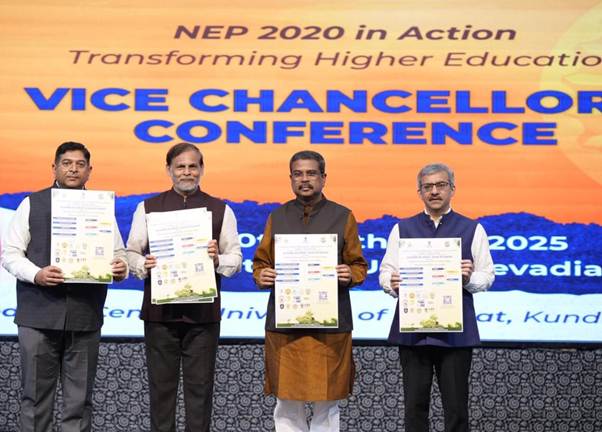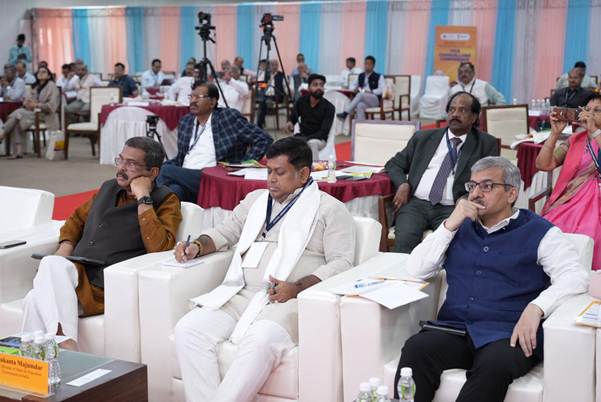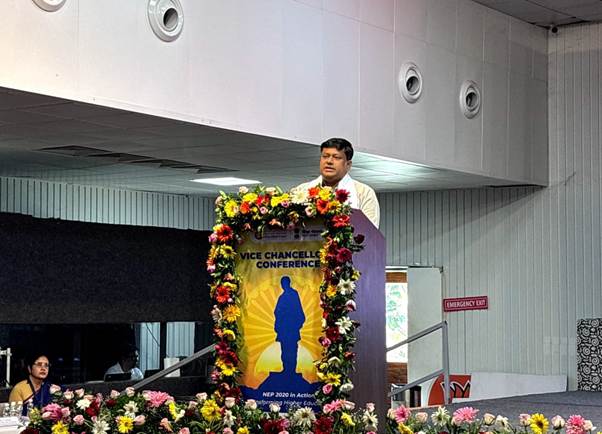Ministry of Education
Vice-Chancellors are the torchbearers of India’s intellectual destiny: Dr. Sukanta Majumdar
Two Day Discussions focused on strategic alignment with NEP 2020, Peer learning and Knowledge Exchange and Forward Planning and Readiness
Panch Sankalpa of NEP 2020 to be the guiding principle for HEIs
Central universities to prepare strategy paper for Viksit Bharat
Two-day Vice Chancellors’ Conference of Central Universities at Kevadia concludes
प्रविष्टि तिथि:
11 JUL 2025 2:59PM by PIB Delhi
The Ministry of Education successfully convened a two-day Vice Chancellors Conference of Central Universities in Kevadia, Gujarat from 10th -11th July 2025. The event was attended by the Hon’ble Union minister for Education, Shri Dharmendra Pradhan; Hon’ble Minister of State for Education, Dr. Sukanta Majumdar; senior officials from the Ministry of Education and Vice Chancellors of Central Universities.

Dr. Sukanta Majumdar in his address at the concluding session stated Sardar Patel, believed in the transformative power of unity, discipline, and education. It was his vision that forms the bedrock of our National Education Policy (NEP) 2020 - a visionary and futuristic reform aimed at making Indian education globally competitive while being rooted in Indian values. The Minister said women’s participation in higher education also witnessed significant growth, with female enrolment rising from 1.57 crore in 2014-15 to 2.07 crore in 2021-22, marking a 32% increase. Highlighting the achievements of NEP 2020, Shri Majumdar stated the integration of technology in education has been accelerated through platforms like SWAYAM. Over 295 universities allowed up to 40% of academic credits through SWAYAM courses. The platform was now issuing nearly 9 lakh certificates annually. He further stated NEP 2020 promoted multi lingualism as JEE, NEET, and CUET were being conducted in 13 regional languages. Due to the NEP 2020 policy initiatives, India made its best-ever performance in the QS World University Rankings 2026: A total of 54 Indian institutions were ranked which was a five-fold increase since 2015. The Academic Bank of Credits (ABC) - a cornerstone of student-centric learning - now has over 2.75 crore students registered and includes 1,667 higher education institutions, many of which are Central Universities.
Elaborating further Dr. Majumdar said the visionary leadership of Hon’ble Prime Minister ensured the National Education Policy 2020 - was not just a reform, but a renaissance in Indian education, empowering every learner to think globally while staying rooted in India’s civilizational ethos. The Hon’ble Miniter called upon the VCs to take key steps to mainstream NEP 2020 by accelerating, NEP 2020 implementation across all domains, strengthen research and innovation ecosystems within universities, Foster collaboration with industries and institutions and Champion equity and excellence as twin goals.

Speaking at the concluding session, Secretary (HE), Dr. Vineet Joshi highlighted the key takeaways and expectations from the two day conference. Implementing NHEQF, NCrF, and the Four-Year Undergraduate Programme is not just a policy priority—it is a structural shift. The transition must be institutionalised thoughtfully but without delay. We must prepare our students for the future of work by ensuring our curricula, pedagogy, and internships align with real-world skill demands. Platforms like SWAYAM and AAPAR must be embedded into the teaching-learning ecosystem. Credit transfer, blended learning, and digital inclusion are now part of core academic delivery—not add-ons. University governance must be made agile, data-driven, and citizen-centric. Tools like SAMARTH are enablers in this transformation, and I expect your active leadership in their adoption. Our higher education system must reflect the spirit of equity and inclusion. From admissions to faculty diversity and campus environment, inclusiveness must be measurable and visible in terms of participation opportunities and deliverables.

Secretary (HE) further stated the Indian Knowledge System and Bharatiya Bhashas were not just cultural legacies—they were sources of academic strength and identity. Their integration must be strategic and meaningful through active student participation in a culturally rich environment. We should work towards enriching libraries with IKS resources, setting up knowledge clubs, language labs, and incubation centres for innovation.
It was decided that the central universities would prepare strategy papers respectively for further discussions on the way forward to strategize for Viksit bharat 2047. It was mentioned that the key themes to be incorporated in the strategy should include: multidisciplinary integration of subjects, mainstreaming Indian Knowledge System (IKS), devising strategies for tech driven education to promote skilling and up-skilling, campus initiatives focusing on innovation and integration of technology with traditional values and conferences like VC’s conference should be organised in the individual university campuses.
One of the significant parts of the conference were the discussion held with Vice Chancellors who deliberated on key pillars of NEP 2020—access, equity, quality, affordability, and accountability—as they apply to institutional governance, academic innovation, digital learning, research excellence, and global engagement. The discussions were grounded in insights from their personal experiences of implementing NEP 2020 reforms in their own universities and learning from it.
On the first day of the conference, discussions centred around core structural and academic reforms envisioned under the National Education Policy (NEP) 2020. The session on Understanding and Implementation of the National Higher Education Qualification Framework (NHEQF) and the National Credit Framework (NCrF), with a focus on the Four-Year Undergraduate Programme (FYUP), highlighted the shift toward flexible, multidisciplinary education and seamless academic mobility. The dialogue on the Future of Work focused on realigning university curricula with emerging global job roles and technological advancements to ensure industry relevance and employability. In the session on Digital Education, initiatives such as SWAYAM, SWAYAM Plus, and APAAR were discussed as critical tools for flexible learning pathways, multilingual e-content, and credit portability. The session on SAMARTH e-governance system stressed the importance of digital integration in strengthening university operations and transparency. Discussions on Promotion of Equity in Higher Education Institutions (HEIs) addressed the need to bridge regional and socio-cultural disparities, while the session on Education in Bhartiya Bhasha and Indian Knowledge Systems (IKS) explored how Central Universities can lead the integration of indigenous languages and knowledge systems into mainstream higher education, in alignment with the transformative vision of NEP 2020.
On the second day, the sessions turned towards innovation, quality assurance, global engagement, and capacity building, areas that support NEP 2020’s vision of transforming India into a global knowledge superpower by 2047. The session on Research and Innovation, which included discussions on the Anusandhan National Research Foundation (ANRF), Centres of Excellence (CoEs), and the Prime Minister’s Research Fellowship (PMRF), focused on strengthening institutional research ecosystems and nurturing interdisciplinary inquiry. The dialogue on the Ranking and Accreditation System explored strategies for improving institutional quality, transparency, and global standing through frameworks like NIRF and NAAC. The session on Internationalisation, with a focus on the Study in India programme and enabling regulations for Foreign Higher Educational Institutions (FHEIs) to establish campuses in India, reaffirmed India’s intent to become a preferred global education destination. Lastly, the session on Faculty Development highlighted the pivotal role of the Malaviya Mission Teacher Training Programme (MMTTP) in equipping educators with future-ready pedagogies and supporting continuous professional development. Collectively, these discussions are expected to catalyse systemic transformation across Central Universities, furthering the effective implementation of NEP 2020 in the years ahead.
The two-day event brought together a wide range of institutional voices, including the University of Delhi, Jawaharlal Nehru University (JNU), Visva-Bharati, Jamia Millia Islamia, Assam University, Banaras Hindu University (BHU), IGNOU, Nalanda University, Tripura University, Central University of Jharkhand, Central University of Kashmir, Hemvati Nandan Bahuguna Garhwal University, Tata Institute of Social Sciences, South Asian University and Kendriya Hindi Sansthan (KHS), showcasing the diversity and strength of India’s education ecosystem. The event was started on the morning of 10th July with a yoga session, setting a reflective and holistic tone in line with the NEP 2020’s emphasis on well-being and the integration of body, mind, and spirit into the educational experience.
*****
MV/AK
MOE/DoHE/11 July 2025/35
(रिलीज़ आईडी: 2143997)
आगंतुक पटल : 277